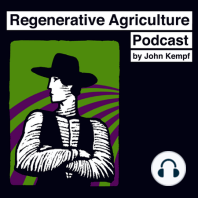58 min listen

3 Things To Do When Plants Don't Respond to Nutrient Applications
3 Things To Do When Plants Don't Respond to Nutrient Applications
ratings:
Length:
10 minutes
Released:
Jul 31, 2018
Format:
Podcast episode
Description
Sometimes growers apply fertilizers to crops that don’t respond to the applications like they're expecting. When plant health and vigor is in a decline, and nutrient applications don’t move the needle, how can we reclaim the situation? Through our consulting experience, we have learned that when nutrient applications bring little response and plants are going downhill, applying the right biology will reverse the direction of a declining crop with a speed and effectiveness that is almost magical. I discuss the three steps we take to flip directions in short order. Enjoy! Support For This Show & Helping You Grow This show is brought to you by AEA, leaders in regenerative agriculture since 2006. If you are a large-scale grower looking to increase crop revenue and quality, email hello@advancingecoag.com or call 800-495-6603 extension 344 to be connected with a dedicated AEA crop consultant. Feedback & Booking Please send your feedback, requests for topics or guests, or booking request have a Podcast episode recorded LIVE at your event -- to production@regenerativeagriculturepodcast.com. You can email John directly at John@regenerativeagriculturepodcast.com. Sign Up For Special Updates To be alerted via email when new episodes are released, and get special updates about John speaking, teaching, and podcast LIVE recordings, be sure to sign up for our email list.
Released:
Jul 31, 2018
Format:
Podcast episode
Titles in the series (98)
LIVE at ACRES 2018 with Ed Curry: Podcast recorded LIVE on stage at Acres Conference 2018 by Regenerative Agriculture Podcast